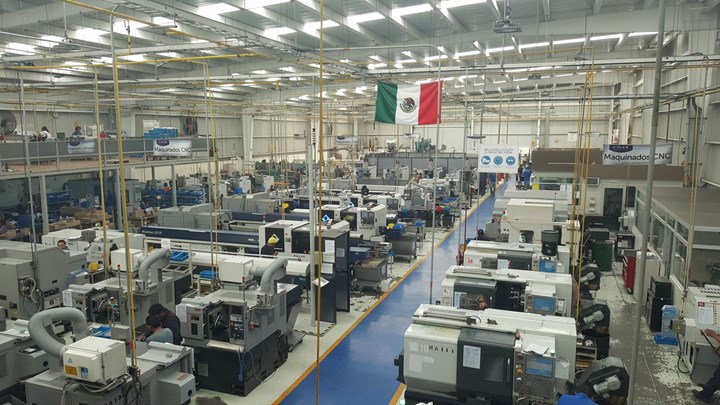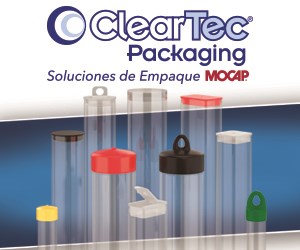10 Things You Should Know About Mexican Machine Shops
The pandemic has knocked on the doors of industrial activity in Mexico, however the Mexican government has created a system of reactivation, giving priority to “essential activities”, which include the automotive and aerospace industries. MMS Mexico has remained in touch with its audience and these are the most important impressions we see in the dynamics of reactivation and market opportunities.
Compartir
GENERAL IMPRESSION OF THE MARKET: ON THE RIGHT TRACK
It looks good in the short term with medium-term uncertainty, especially for a resurgence of COVID. In the long term, the industry’s environment is optimistic due to the phenomenon of Nearshoring and the entry into force of the USMCA, the new free trade agreement between the U.S., Mexico and Canada, especially due to the increase in the Regional Value Content (RVC) in the automotive industry, which changes from 62.5% to 75% in 2023 for light vehicles. For many workshops, the recovery has been rapid, so much so that auto parts production in August 2020 has been equal to that of 2019, but without growth. However, there is uncertainty about what will happen in the coming months.

UNATTENDED PRODUCTION: A LONG WAY TO GO
Many shops in Mexico do not complete the second and third shifts of production. In Mexico the consideration of generating autonomy for machine shops without supervision or lights out is still seen as a medium-term investment. With exceptional cases, of very particular companies that are aware of the importance of this technological resource or because the nature of their business demands it.
ROBOTIZATION FOR ONLINE OPERATIONS
These are medium-term investments. Currently, the shops are more oriented towards improving their manufacturing with a focus on machine tools rather than on material handling and automation. Many shops still rely on manual operations because of the low cost of labor, but those with constant, in-line movement operations do see robots and automation as the best option. There are even some companies that are migrating control systems to Industry 4.0
ERP IS A CRITICAL ISSUE
The use of ERP is increasing and is a critical issue for many shops because without ERP they cannot plan, nor have the possibility of having their processes online to have everything on time. Currently there are 25% of companies and shops that already make serious use. However, in the medium-term it will cover more than half of the shops in Mexico due to market needs.
3D PRINTING AS AN INNOVATION
It is already a closer technology in Mexico and has been implemented in many shops. However, since most of the products are already designed, this technology is somewhat limited in its application. Most of the workshops that use this technology are doing implementations more in the form of innovation and development of their own processes than applied to specific clients.
3D PRINTING ON METALS FOR COMPLEX PARTS
It is a complex issue in Mexico because the shops do not yet see it as an effective application for them. However, there are attempts by research centers to collaborate with companies and one of the challenges is precisely to make this linkage concrete in specific projects linked to OEMs. There is a strong requirement from the automotive industry and industries that require complex parts, where certain traditional processes have been reduced.
WORKHOLDING AS A STANDARD
In Mexico it is a technology that is being applied extensively and is rapidly becoming standardized. It is estimated that by the end of 2021 almost 80% of the machine shops will have standardized palletizing systems in their facilities.
CYBERSECURITY: AN OBLIGATION
Especially with the USMCA trade in which there are specific rules on industrial secrecy regarding patents, the shops will be forced to implement security. Currently, part of this cyber security is already an operable requirement that, in many cases, is already built and will be improved according to the demand of the OEMs and Tier 1 of the automotive industry.
FAMILY SHOPS TO CORPORATE BUSINESSES
The issue of shop owners is changing, not because of acquisitions, but because of the entrepreneurial initiatives of a sector with a lot of incursion of people who are investing or companies that are growing or even diversifying their businesses seeing the opportunity in other markets. Within these opportunities there will be spaces for foreign workshops where the owners or operations do not have continuity. Surely, such shops will be making some move to Mexico and those entrepreneurs could be buying some businesses abroad to bring them to Mexico. On the other hand, many shops are migrating their structure from family business to corporate business in order to survive the demands of the international market.
CERTIFICATIONS: THE GATEWAY TO NEW BUSINESS
In terms of certifications, the automotive, aerospace, electronics and medical industries all require certifications. There are specific programs for accelerated exploration by OEMs and the automotive industry to locate suppliers in Latin America, especially in Mexico, and one of the indispensable requirements is certification. So, certifications are being forced, more by the market and demand than by the desire of businesspeople. On the other hand, in marketing there are diverse efforts, particularly in the shops where there is an accelerated incorporation of sales and marketing structures and, above all, the use of digital tools as a means of promotion and customer linkage. Another phenomenon that is forcing Mexican machine shops to obtain certification is the diversification of markets.
Lea a continuación
Consideraciones para comprar un torno CNC
Los tornos CNC son una de las tecnologías de mecanizado más antiguas; sin embargo, sigue siendo útil recordar los aspectos básicos a la hora de considerar comprar una máquina de este tipo.
Leer MásLa tecnología: recurso primordial para ser proveedor de la industria aeroespacial en México
Indumet Aerospace es una de las empresas pioneras en México como Tier 1 de la industria aeroespacial. La inversión en la última tecnología para el mecanizado en 5 ejes ha sido una de las claves del éxito que la ha llevado a ser proveedora de reconocidos OEM.
Leer MásSistema de sujeción permite a un taller alcanzar las tolerancias requeridas
Este taller de Monterrey, dedicado a la manufactura de ejes para motorreductores, no conseguía alcanzar las tolerancias exigidas por su cliente. El uso de un collet chuck le permitió lograr las dimensiones requeridas y reducir los tiempos del proceso en 54 %.
Leer Más
.jpg;width=70;height=70;mode=crop)

















